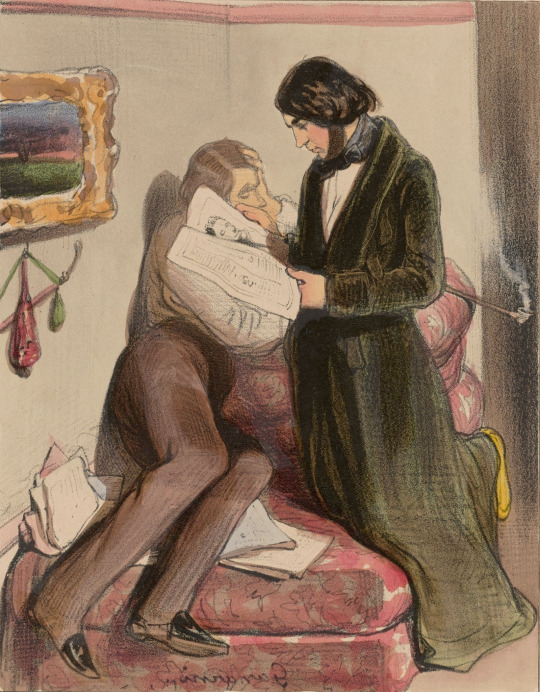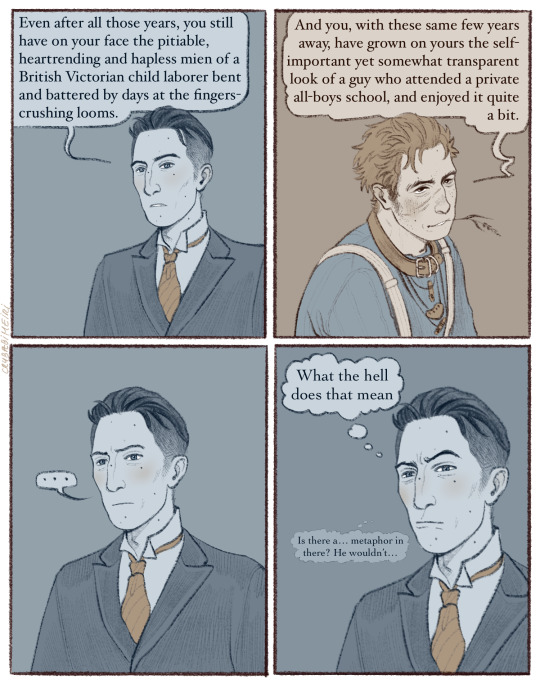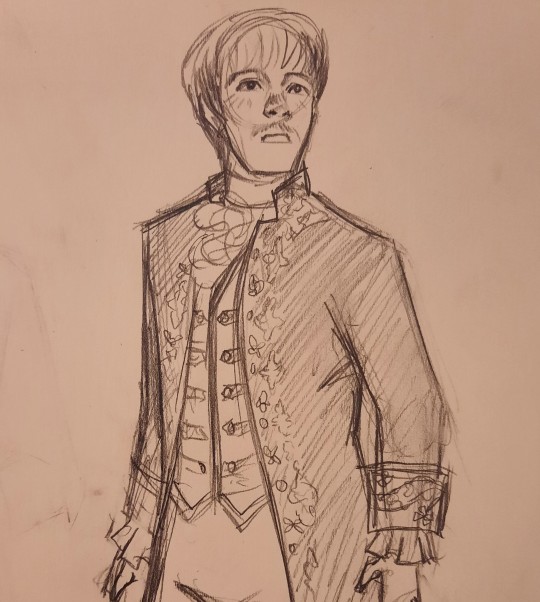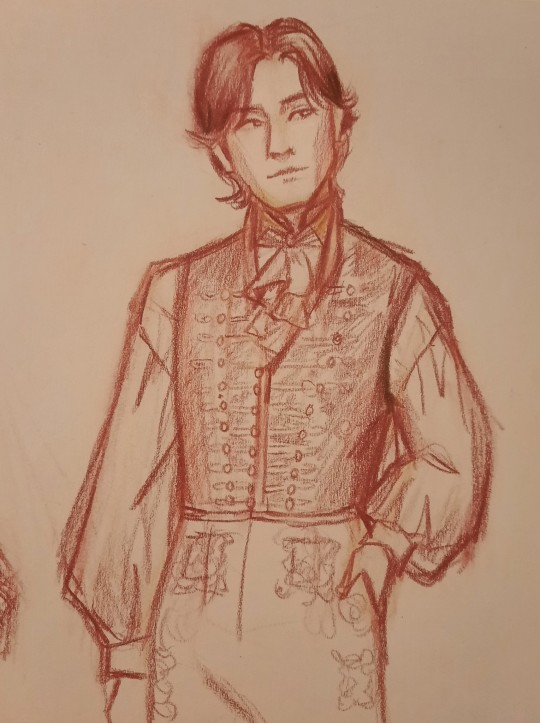#historical typings
Text
why are skirts inherently evil and oppressive in historical fiction until men are wearing them
I've never heard anyone going on at length about how Universally ImpracticalTM the garb of a Scotsman or an ancient Roman politician are
suddenly everyone has a concept of situational practicality that previously was not there
#history#clothing history#historical fiction#'SKIRTS are so IMPRACTICAL-' always? every time? for everyone?#because I don't know about you but I live in a city and work in museums#skirts are A-okay for me#also people have done MANY types of physical activity in skirts for centuries. sometimes pants are more practical for sure!#but. not always.#and you never hear fiction authors talking about how oppressed Scotsmen are by their kilts#'he couldn't FUNCTION because he wasn't wearing PANTS!' I'd like to see someone try it
2K notes
·
View notes
Text



Overprotective 🦂
#Last one I posted a few months ago already but thought they ought to all be together#Just really thinking about this type of design a lot. I wanted to use the modern (ish) military look with the archaic armor#Plus I just like gas masks. I own several. And I wanted to draw the scorpion type armour idea again#art#sketch#character art#Character design#original character art#original art#Oc#Historical#Knight#Gas mask
360 notes
·
View notes
Note
Hi! Do you have a list of historical f/f romances? I have read all historical f/f by Olivia Waite, Annick Trent, KJ Charles, Cat Sebastian, and Jess Everlee, and i can’t seem to find any others! (Also read Freya Marske’s historical fantasy). I love historical queer romance and I don’t mind reading mainly m/m (or other queer pairings) but I’d really like to get some more f/f in the mix!
Well you've mentioned the big names in this ask (and mentioned Sarah Waters in your second ask) so I asked around on my main first and received two recs from @strinak which were The High Priestess by Parhelion on AO3 (it was originally a novel published by Torquere) and Romancing the Inventor by Gail Carriger.
There are some historicals here under the ship type f/f tag, though some might be considered f/nb as well as I can recall.
I've also recced a shorter historical f/f here which is also under that tag. And have read some on AO3 as well, though the only ones I can think of offhand were written by KannaOphelia
But if anyone here has any more, feel free to comment or reblog with a comment (or submit it as a post, so I can officially tag it.)
360 notes
·
View notes
Text
while we're at it i hate that whenever somebody brings up tibetan mastiffs nowadays they're almost always referring to the viral overbred monstrosities coming out of china and not actual normal tibetan mastiffs.
if you're going to a registered breeder who regularly shows their dogs in AKC/KC/CKC circuits, they will look something like this:




in recent decades it became fashionable to breed very exaggerated dogs as a status symbol for wealthy people in china, nothing about these dogs are practical it'll cost an arm and a leg to keep groomed. these are very extreme examples of the breed and really really shouldn't be normalized as the desired tibetan mastiff type:



for contrast, here's a bitch from the 1920s bred in UK and old photos from central asia, yes they were large but were never meaty or extremely heavy-set dogs, they should not look as if they're constantly fighting gravity.



#i love these guys#i should add theres most definitely breeders somewhere in china who are preserving the historic type#i dont want this to come across as superior enlightened western breeders vs backwards chinese breeders of a chinese breed#but its very hard for me to find resources since i can't navigate the chinese websphere but i guarantee theres likeminded ppl over there
302 notes
·
View notes
Text
me when the historical costuming inaccuracy is a design choice, makes sense for the characters, etc: nice
me when the historical costuming inaccuracy is due to cost cutting, unreasonable time crunches placed upon the costumers, trying to appeal to modern fashion, etc: frothing at the mouth /neg
461 notes
·
View notes
Note
Fire and blood is just not good enough for me to care about tiny inaccuracies
i’ll be a book purist for the main series i’m a real feastriot because it’s a 10/10 to me. but I just don’t have it in me to be a shooter for fire and blood. It barely clears a 4/10 outside of certain moments and it’s just so shallow. grrm at his least creative and most misogynistic 
#‘it’s a historical perspective’ it does not work for me. i’ve read good history writing that has depth#are we ready to talk about how there’s only like three female character types in that book#asoiaf#hotd
144 notes
·
View notes
Text

Étude du matin by Paul Gavarni, March 9, 1839.
Still in the 1830s, although these two young men are spiritually in the 1840s already with the long hair and questionable facial hair decisions. One smokes a trendy chibouk pipe and shows a great view of straps on his trousers.
#paul gavarni#Eighteen-Thirties Thursday#1830s#1839#fashion history#historical men's fashion#romantic era#monarchie de juillet#and the other one has yellow slippers with a green robe de chambre#1840s type choices#étude du matin#smoking
164 notes
·
View notes
Text


Some random ghost dad sketches. Kyle is at it again
#it's hard keeping an ancient historical manor in check when you've got a bunch of baby ghost pokemon running around#a bunch of which are probably naturally on fire#kyle is probably a litwick#Caduceus: where are your parents#Kyle: wouldn't you like to know reaper boy#pokemon#pokemon oc#Caduceus#Cade's Manor#pmd#ghost type#dusknoir#ghastly#litwick#silverpsychedelic
99 notes
·
View notes
Text
Wild how we know that Elizabeth Woodville was officially appointed to royal councils in her own right during her husband’s reign and fortified the Tower of London in preparation of a siege while 8-months pregnant and had forces gathering at Westminster “in the queen’s name” in 1483 – only for NONE of these things to be even included, let alone explored, in the vast majority of scholarship and historical novels involving her.
#lol I don't remember writing this - I found it when I was searching for something else in my drafts. But it's 100% true so I had to post it.#elizabeth woodville#my post#Imo this is mainly because Elizabeth's negative historiography has always involved both vilification and diminishment in equal measure.#and because her brand of vilification (femme fatale; intriguer) suggests more indirect/“feminine” than legitimate/forceful types of power#It's still bizarre though-you'd think these would be some of the most famous & defining aspects of Elizabeth's life. But apparently not#I guess she only matters when it comes to marrying Edward and Promoting Her Family and scheming against Richard#There is very lacking interest in her beyond those things even in her traditionally negative depictions#And most of her “reassessments” tend to do diminish her so badly she's rendered utterly irrelevant and almost pathetic by the end of it#Even when some of these things *are* mentioned they're never truly emphasized as they should be.#See: her formal appointment in royal councils. It was highly unconventional + entirely unprecedented for queens in the 14th & 15th century#You'd think this would be incredibly important and highlighted when analyzing late medieval queenship in England but apparently not#Historians are more willing to straight-up INVENT positions & roles for so many other late medieval queens/king's mothers that didn't exist#(not getting into this right now it's too long...)#But somehow acknowledging and discussing Elizabeth's ACTUAL formally appointed role is too much for them I guess#She's either subsumed into the general vilification of her family (never mind that they were known as 'the queen's kin' to actual#contemporaries; they were defined by HER not the other way around) or she's rendered utterly insignificant by historians. Often both.#But at the end of the day her individual role and identity often overlooked or downplayed in both scenarios#and ofc I've said this before but - there has literally never been a proper reassessment of Elizabeth's role in 1483-85 TILL DATE#despite the fact that it's such a sensational and well-known time period in medieval England#This isn't even a Wars of the Roses thing. Both Margaret of Anjou and Margaret Beaufort have had multiple different reassessments#of their roles and positions during their respective crises/upheavals by now;#There is simply a distinct lack of interest in reassessing Elizabeth in a similar way and I think this needs to be acknowledged.#Speaking of which - there's also a persistent habit of analyzing her through the context of Margaret of Anjou or Elizabeth of York#(either as a parallel or a foil) rather than as a historical figure in HER OWN RIGHT#that's also too long to get into I just wanted to point it out because I hate it and I think it's utterly senseless#I've so much to say about how all of this affects her portrayal in historical fiction as well but that's going into a whole other tangent#anyway- I am forever judging historical/fictional books that center around or heavily involve Elizabeth which do not highlight these things#ofc there are other things but these in particular *really* frustrate me#just felt like ranting a bit in the tags because these are all things that I want to individually discuss someday with proper posts...
77 notes
·
View notes
Text
Michael streamer au where he plays all of the in universe fnaf games to see of they're accurate as to how the events actually unfolded
(No see the reason why glamfreddy constantly needs charge every hour is because he's secretly running a high cpu video game in the background, trust)
#fnaf#michael afton#five nights at freddy’s#glammike#michael afton my beautiful pookie#he does all of this then makes a “all the historical inaccuracies of Five Nights at Freddy's” type video#nonono trust gregory is trying to be quiet and sneak around an animatronic and glamfred just blurts “that is NOT what happened!” and and an
283 notes
·
View notes
Text

the bickering habit
#well i know. personally i know.#''ok oxford goer''-voice of a guy who hasn't stepped foot in an educational institution and is slowly starting to become literate around 20#this is a post-canon thing but not far enough in the future to have fit day 8 ''10 years later'' prompt so... on its own it goes#notkin#notkin pathologic#khan kain#he sees the type of person you are#pathologic 2#i'm of the hashtag opinion patho takes place in the 1910s at the earliest (patho 2 bachelor route looks like it's closer to the 1930s) so#by that point ^ the ''victorian era'' had been over for over 10yrs#while the the industrial revolution; which was marked by the use of child labor AND more legislation over it; predates the victorian era;#it was still ongoing + culminated during queen Victoria's reign (she also implanted many laws to minimize some forms of child labor)#so. victorian orphan + child laborer venn diagram is real and historically-congruent#inheriting the earth patho tag
355 notes
·
View notes
Text
I'm pretty firmly of the opinion that understanding history is necessary to prevent the worst parts of it from repeating, so I spend a lot of my free time trying to learn about things like colonialism, slavery, genocide -- and it worries me to no end to see how much the majority of people don't seem to understand even about events everyone is familiar with. I used to be baffled that anyone could genuinely believe slavery was "just how things were back then", but it makes sense when you realize that most history lessons only deal with what the people in power decided to do; public outrage about a particular action only matters in the historical context if that outrage led to actual mass revolution. Even before we get to the layers of whitewashing and propaganda constantly applied to history, there's an innate bias toward treating major political movements as though they just appear and disappear entirely at random. Which leads me to wonder...
Do fellow gentiles realize that the Nazis weren't new?
What I mean is that most coverage I see of the Nazi ascension to power in Germany presents them as this new, fringe group that came to power out of nowhere through solely violent means. Sometimes there will be explicit mention of the fact that antisemitism was extremely prevalent throughout Germany (occasionally even the rest of Europe!) prior to Hitler's political campaign, but oftentimes it seems implicit that mass antisemitism in Germany began when the NSDAP first formed. Even when the prior existence of antisemitism is brought up, the Nazis are portrayed as a new, unique evil; they did things that no democratic society would ever dream of doing, things that could only be achieved by either completely hiding them from the public or by threatening anyone who spoke against them. "Nazi" is simultaneously an easy epithet for any excessively cruel or restrictive person and a label that is far too severe to seriously apply to anyone because the Nazis were so evil in a way that nobody else was that nobody is truly deserving of comparison.
The thing is, though, that the policies put into place by the Nazi government in order to enable their genocidal end goal weren't original. Even setting aside the fact that they're often viewed as the inventors of genocide despite Hitler openly admitting that he got the idea from the treatment of Indigenous peoples by the U.S.A. (highly recommend watching this BadEmpanada video to learn about that), very few of the Nazis' beliefs or actions were original to the Nazis. The conspiratorial, racially-puristic ideas that the Nazis touted were derived from contemporary conservative thinkers all across the West, and many of the antisemitic legal policies they implemented as part of their Final Solution were practices that had been standard throughout Europe for centuries prior.
The infamous yellow-star badges used to identify Jewish citizens? Those were first devised and enforced the region (by both Christian and Muslim rulers) at least as early as the 800s; it was 1215 when Pope Innocent III declared that all Jewish and Muslim people living in Catholic lands should be required to wear identifying clothing with the explicit goal of segregating them from Christians. The Nazi ghettos to which Jewish citizens were forcibly relocated were inspired by ghettos which had existed to segregate and isolate Jewish populations for centuries; the only real difference is that these new ghettos were just preludes to concentration camps rather than being meant for long-term habitation. Just about every part of Western society had some form of restriction (mandated or voluntary) banning Jewish people from occupying certain jobs or limiting their presence in universities going back centuries before the Nazis existed. There were more than 350 years where Jewish people were not legally permitted to live in England.
The reason I bring all of this up is because, even among people who are conscious of Europe's widespread antisemitism prior to the rise of Nazism, there's a strong notion that the Nazis were so detestable because they came out of nowhere; that they completely defied the norms of the day and took their antisemitism to a level that even the deeply antisemitic societies of past Europe never would have.
In reality, the Nazis weren't much of an escalation -- they were a return. Legal segregation, expulsion, and even slaughter of Jewish people really only began to end when the Enlightenment came and public sentiment in the West began to favor secular government. The first country to abolish legal restrictions on Jewish people was Revolutionary France in the 1790s. Russia maintained its restrictions on Jewish citizens' rights up until it also saw revolution in 1917. The idea that Jewish people were responsible for all of society's ills and needed to be subjugated and exterminated was not a new idea that took hold of Germany due to its economic suffering after World War 1; it was a very old, very popular idea that most of Europe had only just begun to abandon and which was brought back in full force the moment it became politically convenient.
Consider how this compares to present-day politics. Jewish Germans were only granted equal rights in 1871 -- Adolf Hitler's father and mother were 34 and 11 years old, respectively -- and when the Nazi Party formed only 49 years later, the majority of adult Germans would have grown up in or been raised by parents who grew up in a world before religious desegregation. The Nazi Party's promise to the German public was not to introduce a newly bigoted society, but to bring back the bigotry they had grown up with and ensure that it would never leave again; they succeeded by using Germany's post-war suffering to "prove" their society was declining and blaming that decline on a recent major societal change, thereby convincing Christian Germans who were still deeply antisemitic that you see? we let the Jews have rights and not even fifty years later everything is awful. Many Germans did not need to be lied to or forced into supporting the Nazis because, to them, the Nazis were just fighting to revive the "Good Old Days" of their youths.
As a political party, the Nazis were functionally identical to all of the modern-day pundits eagerly proclaiming that racial equality and LGBT equality and religious diversity and welfare policies are destroying the country. Any period of significant economic downturn, any large cultural shift, any major catastrophe no matter the cause is automatically the decline of Western Society to them -- and the blame for that decline is always placed on the most relevant pro-equality social movements. What makes the Nazis unique is not their goals or the beliefs that fueled them; what makes the Nazis unique is that they're the latest and largest example of a group like them gaining power and then rapidly losing that power, which makes them simultaneously martyr idols for subsequent fascists and sacrificial vessels through which liberals can pretend the world's evils were expunged.
Any major shift in favor of granting rights to the oppressed inevitably stirs up a proportional conservative backlash with the effort of reversing course -- not just by revoking those new rights, but by making the previous inequality worse so that it becomes harder to undo again. If we care about ensuring an equitable future, it is vital to understand that the fight for that future does not end with a law being passed. It ends only when equality for all is so well-established as a social norm that there is no way to benefit from pushing for its destruction. Do not get complacent.
#pepperpost#antisemitism#long post#disclaimer that i am not a historical expert and this is not intended as a professional essay. it's pretty surface-level t.b.h.#second disclaimer that this is not meant as doomsaying. i believe people are good by default#anyway. spent way too long typing all this out mostly to try and mull over my own recent thoughts on this subject#hopefully it's coherent to anyone else
297 notes
·
View notes
Text
Alfred: An academically smart and intelligent man that probably has multiple college degrees on top of his formal colonial aristocratic English education
Also Alfred: Stunned into tragic silence in the 1940s when finding out the trojan horse story was just a legend
#Alfred: wut 😕#inspired by this article I was reading about how Americans got really into Greek and roman fables bc democracy but like no one clarified#to them the stories were fictional and not real so they passed down as “funny parts of history!” types of stories#hws america#hws greece#hws rome#alfred f jones#historical hetalia
64 notes
·
View notes
Text
messy self-indulgent doodles with inconsistent proportions time


bojan and jure dressed in 1780s fancy coats woo


kris dressed in regency clothing
thank you for listening
#AGH I REALLY WANT TO MAKE A PROPER PIECE WITH THIS CONCEPT#maybe some day i'll do it#can you guess whether or not i had a hamilton phase#that is misleading i was into historical western fashion before i got into hamilton but hamilton certainly didn't help#imaGINE THE COATS HAVING THEIR LACE PATTERNS YES YES i just got lazy#joker out#doodle type thing#my art#kris guštin#bojan cvjetićanin#jure maček#joker out fanart#fanart#old timey joker out#yup that's the tag for this i decided#18th century#19th century
164 notes
·
View notes
Text
so all the descriptions of people calling hamilton "slender" "small" "youth" "stripling" and "boyish" are just telling me that he had the look vibe and body of timothee chalamet is that correct
#ham was a captain in the army and the person went “what is a boy doing here”#honestly timothee in cmbyn is probably exactly ham's body type when he was younger#alexander hamilton#historical hamilton#amrev#hamilton
83 notes
·
View notes
Text

Doorway onto the Renaissance spiral staircase in the Château Royale, Blois
#architecture#blois#renaissance#seeing this building with francis I’s salamander symbol all over it makes Ever After a bit funny in hindsight#bc they certainly use that exact dragon lizard image in the movie costuming#like we’re making a movie and the king is francis (check) and it has da vinci (check) and we mention divorce in england (check)#and his son is called henry (check) and like we’re putting salamanders of the EXACT same type on all the pages outfits (check)#like this is DEFINITELY the actual historical henry son of francis and i guess it’s OK we say henry marries a commoner in the movie#as long as she’s not like super well known i guess#(consults notes) oh he married CATHERINE DE MEDICI#cool cool sure#i mean ok in other news henry DID technically marry a commoner? if you want to get technical?
44 notes
·
View notes